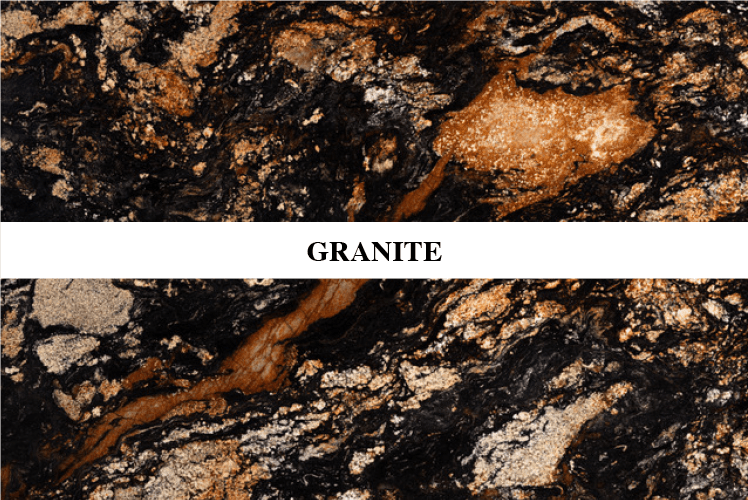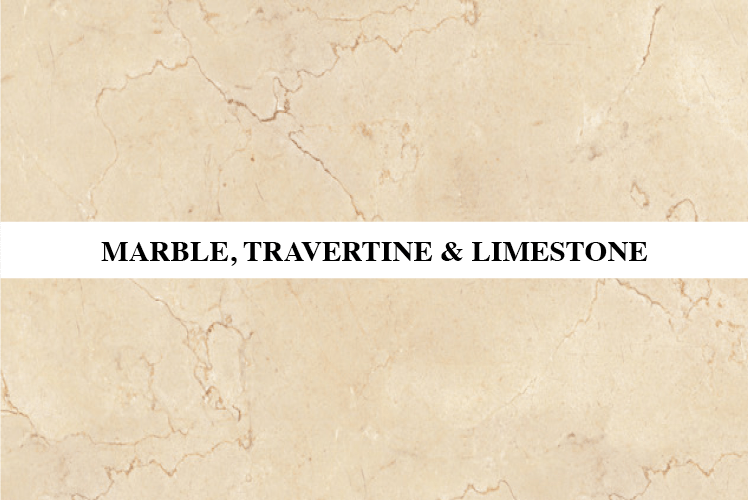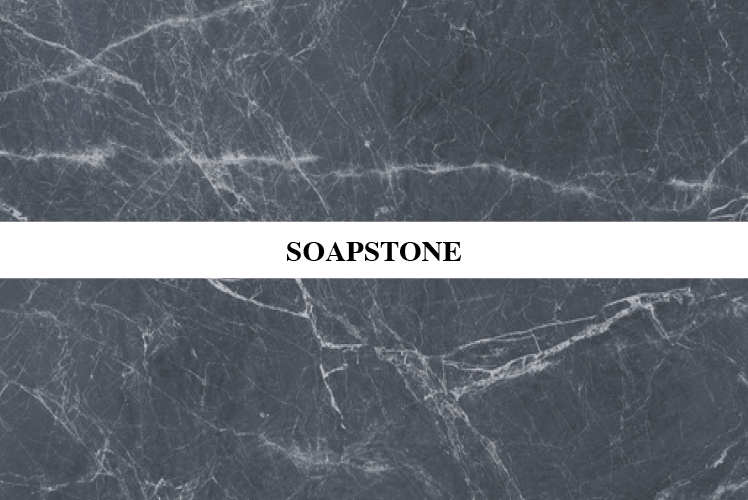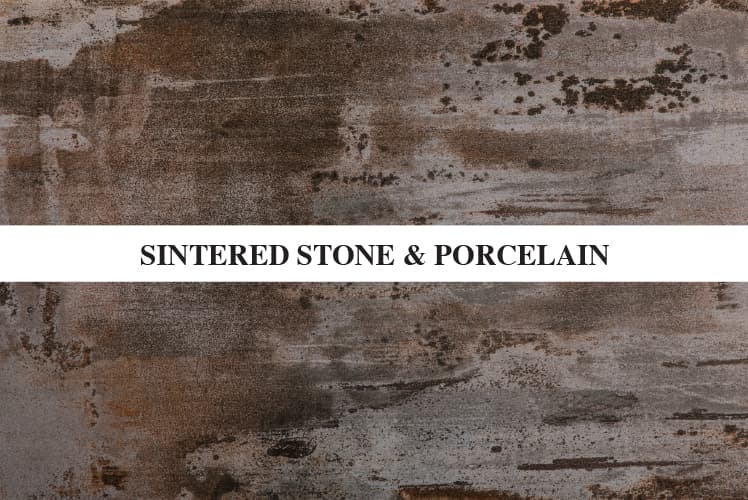About Stone
There are a myriad of choices when it comes to selecting your countertop material, and we are here to help you find the right one for your home and lifestyle.
It’s definitely not “one size fits all”!
The Basics
Quartz has become the most popular stone choice for countertops. Quartz is a manufactured stone which requires zero maintenance beyond regular cleaning. It is extremely strong as well as stain and scratch resistant. You can choose from solid colors to intricate patterns that replicate the look of natural stone (especially marble). We have an extensive collection of samples from several manufacturers on display in our showroom.
Natural stone is as beautiful as it is functional. Granite, Quartzite, Marble and Soapstone are the most often used for countertops. There are endless variations in color and pattern in natural stone, and no two slabs are identical. Granite ranges from exotic varieties with dramatic veins of color to more consistent patterns, and its durability is hard to beat. Quartzite is beautiful, extremely durable and offers unique and subtle veining patterns and colors. Marble has a timeless elegance everyone recognizes. Soapstone is remarkably non-reactive to heat and substances and has been used on countertops as well as fireplaces and hearths throughout history.
Click on the images or the expandable table below to learn more about the differences between these materials. Feel free to contact us with any questions you may have. Also, check out our Links page to start browsing.
More About Stone
Granite is the most widely used natural stone for countertop applications. There are thousands of varieties of granite to choose from, ranging from dramatically veined exotics to timeless black. Most granite has a distinct crystal structure which results in unique patterns. Granite is available in different surface finishes: Polished, which is flat and glossy; Leathered (aka Satin or Antiqued), which is textured and matte; and Honed, which is flat and matte. Like snowflakes, no two slabs of granite are identical. Due to the vast variation between slabs, we strongly recommend selecting your specific slabs in person.

Granite is heat, stain and scratch resistant. In most cases a hot pan will not damage it; however, it’s still advisable to use a hot pad or trivet. It is easy to clean – soap and water are adequate, or you can use one of the many convenient spray cleaners made for natural stone. It is difficult to damage granite, but you should avoid exposing it to heavy chemicals such as oven cleaner, and if you cut directly on it you are likely to dull your knives. Your granite countertops will be treated with a sealer upon installation. The sealer acts as a layer of protection against stains, as well as enhances the depth of color.
We recommend re-sealing your countertops once every year or two, depending on the variety and level of use. It’s a relatively simple process – just pour on a liquid sealer and buff it off with a cloth as you go.
Quartz is very similar to granite in durability, but requires absolutely zero maintenance beyond typical cleaning! It is produced using crushed natural quartz, one of the hardest and most abundant minerals on Earth. Quartz slabs contain 90-93% natural quartz, with the balance being made up of pigments and high quality polymer resins. The results are remarkably strong, non-porous, stain and scratch resistant slabs. When using Quartz on a countertop overhang for seating, we can extend out up to 14” without any additional supports such as corbels or steel (with natural stone that distance is only 6-8”). Most Quartz is also NSF, Greenguard and LEED certified, assuring homeowners of environmental safety.
There is an ever increasing spectrum of dynamic colors and patterns available in Quartz, and we work with several leading manufacturers. There are options which mimic the look of natural stone – particularly marble, without the maintenance! – but also solid, consistent colors, including various shades of solid white. There are hundreds to choose from, and our showroom displays offer something for everyone. Many manufacturers offer select colors in matte finishes, referred to as Honed, Suede or Concrete depending on the manufacturer. These finishes may require more maintenance than a polished surface.

Quartz simplifies daily life because it requires no maintenance, but it also greatly simplifies the selection process. Since Quartz is manufactured, it is extremely consistent. Unlike natural stone, you can count on the sample color matching the slab. When you visit our showroom, we will work with you to select the right Quartz based on our extensive selection of samples, and we will ensure that you are able to view an entire slab in order to get a better idea of the veining and patterns contained in the slabs.
Visit us today to explore all the possibilities of Quartz for your home, or follow the links below to start browsing!
Marble has been used throughout history as a building material, as well as being transformed into masterpieces by sculptors. Most varieties of marble have characteristic swirls and veins, and it lends its refined elegance to classic and modern design alike. Travertine is marble formed in ancient “hot springs” – the holes you see in Travertine were in fact air bubbles which became trapped in the stone as it formed. Limestone is marble formed on sea shelves, which explains why so many varieties feature shells and fossils.

Marble requires much more preventative maintenance than granite or Quartz. It is softer and remarkably more porous by nature, making it more susceptible to scratching, chipping and especially staining. Acidic substances (lemon juice, vinegar, wine, etc.) damage marble by etching into the surface. Marble needs to be sealed frequently – every six months is a reasonable expectation – and even when it is properly sealed it remains easily damaged. It is important to be aware of the maintenance related to marble, and to consider the typical daily uses of the areas you are considering installing it in.
Soapstone is superior to other natural stone when it comes to heat. It is often used as cladding on wood burning stoves, and retains and radiates heat evenly. It makes a wonderful fireplace surround! Soapstone doesn’t stain, and does not require a sealer. Instead, most Soapstone is typically treated with mineral oil to darken and enhance the color of the stone. It’s not necessary to oil soapstone, but most people prefer the deeper color produced by doing so. Soapstone is not affected by acids contained in typical kitchen items like lemons, wine, or vinegar. Historically, it has been used as laboratory surfaces, and it is a beautiful, practical and durable work surface in the kitchen.
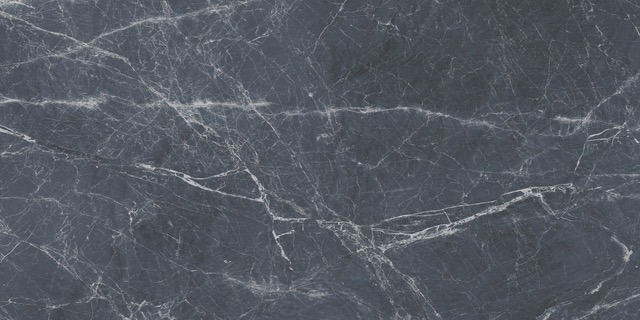
Soapstone has a matte finish, and a luxurious texture (hence the “soap” in Soapstone). Soapstone can and will scratch. Happily, most scratches can be subdued by a light sanding and oiling, and over time small scratches add to the patina. Soapstone is available in shades of grey and black, with most having green undertones that are enhanced by oiling, and it typically has delicate but dramatic white veining throughout.
Quartzite is a natural stone which mostly consists of natural quartz. It is extremely hard compared to other natural stones (even granite). It is also remarkably durable with high scratch, stain, chemical and heat resistance. Quartzite is visually unique as well, and offers “softer” veining or movement than most granite varieties – it often resembles marble but is light years more durable. Quartzite also has a subtle opacity or depth that is not found in other stone. Many quartzite varieties are white or grey with subtle yet distinct veins, but there are varieties which contain almost every color in the spectrum!
Quartzite slabs can be so stunning it seems as if you should simply hang them as art! As with all natural stone, each slab of quartzite is unique, and we recommend selecting your slabs in person as you would with granite.
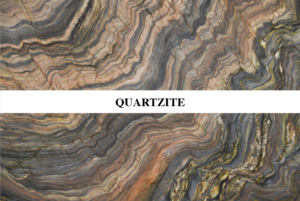
Sintered stone and porcelain slabs are quickly becoming some of the most popular surfaces for both indoor and outdoor applications. They are particularly suited to vertical surfaces – think shower walls and fireplaces – as well as serving as beautiful and durable countertops. Dekton and Neolith are both brands of sintered stone, which consists of quartz, glass and porcelain. Porcelain slabs such as Magnifica, Panoramic and Caesarstone porcelain are true porcelain slabs. Sintered stone and porcelain are extremely heat resistant – no need to worry about hot pans in the kitchen! They are scratch and stain resistant products, and do not require any maintenance such as sealing.

There are so many different looks which can be achieved with these materials, from textured industrial colors that recall aged metals, to extremely high gloss elegant marbled looks. They are not “through body” products, and there are some fabrication considerations to be aware of when selecting sintered stone or porcelain for your home. We will be sure to discuss all the nuances with you when you visit us.

